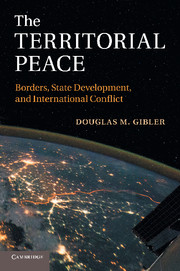3 - Individual, state, and territorial issues
from PART I - INTERNATIONAL BORDERS
Published online by Cambridge University Press: 05 October 2012
Summary
Introduction
We know well that territorial issues are linked to an increased rate of disputes and war. Completely underdeveloped, however, are explanations of why territorial issues are so salient to the states that fight these conflicts. Unlike other types of issues, I argue that territorial issues often constitute direct threats to individual lives and livelihoods, and this triggers many of the basic biological and psychological responses to threat that are endemic to humans. Indeed, for an individual in a threatened country, territorial issues may overshadow all other environmental factors that determine such core political attitudes as personal identity and tolerance for others. Of course, wars are organized violence perpetrated by states, and just because individuals are affected by territorial issues does not mean that international conflict follows. This is especially true in states that do not necessarily reflect citizen interests. I therefore develop the link between individual behavior and international conflict in two distinct ways.
First, I argue that individuals in threatened territories are apprehensive, for many reasons, about their land and the risk of war. These citizens seek security from the state. This type of political environment aids the creation of large, standing armies and allows the leader to centralize their own power within the regime.
Second, territorial issues will affect the state for a long time. The creation of large, standing armies alters both the repressive capacity of elites and the distribution of power among groups within a society.
- Type
- Chapter
- Information
- The Territorial PeaceBorders, State Development, and International Conflict, pp. 25 - 46Publisher: Cambridge University PressPrint publication year: 2012



